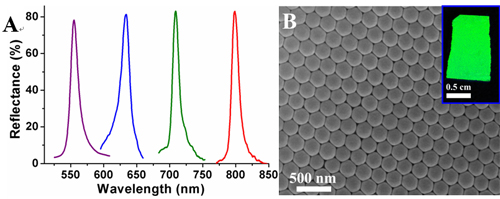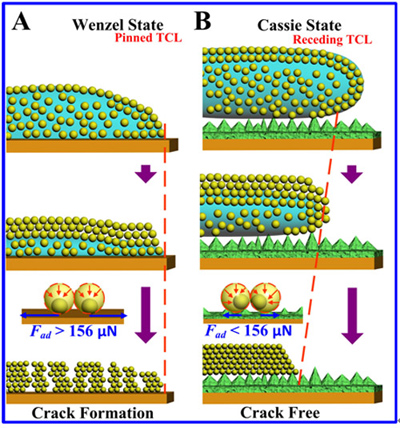Colloidal Photonic Crystals with Narrow Stopbands Assembled from Low-Adhesive Superhydrophobic Substrates
Photonic crystals (PCs) are of interest in the emerging area of optical materials for controlling and manipulating light propagation. In previous work, researchers of the Key Laboratory of Organic Solids and Laboratory of New Materials at Institute of Chemistry, Chinese Academy of Sciences, have make series progress on fabricating functional PCs and applying them to in catalyst, sensing, label-free detection, high-performance optical devices, and other fields (Acc. Chem. Res. 2011, 44, 405-415).
Recently, supported by the National Natural Science Foundation of China, the Ministry of Science and Technology of P. R. China, and the Chinese Academy of Sciences, Prof. SONG Yanlin’s group in the Laboratory of New Materials of Institute of Chemistry developed a facile approach to fabricate centimeter-scale colloidal PCs with narrow stopbands assembled on low-adhesive superhydrophobic substrates. The full-width-at-half-maxima of the stopbands are just 12 nm. Latex suspension on this substrate displays a receding three-phase contact line during the evaporation process, which releases tensile stress induced by latex shrinkage and results in complete elimination of cracks in the colloidal PCs. This facile fabrication of large scale PCs with narrow stopbands will offer significant insights into the design and creation of novel optical devices. The results have been published in J. Am. Chem. Soc. 2012, 134, 17053-17058.

Figure 1. Typical SEM image (A) and UV−vis reflection spectra of colloidal PCs from latex particles with various diameters (B) assembled on the low-adhesive superhydrophobic substrates. Inset in (A) is a photograph of a part of the PCs, with the scale bar of 0.5 cm. (Image by HUANG Yu)

Figure 2. Schematic illustration of colloidal PCs assembled on high Fad substrate (A) and low Fad superhydrophobic substrate (B). (Image by HUANG Yu)





